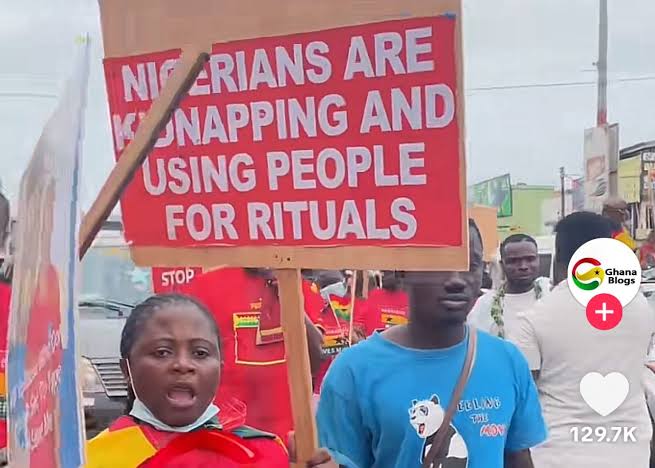Trending
Nigerians in Ghana Raise Concerns Over Discrimination Amid ‘Nigerians Must Go’ Protest
Tensions flared in Ghana on Tuesday, July 29, as a group of Ghanaians took to the streets in a protest tagged “Nigerians Must Go.

” The protesters, seen in red t-shirts and carrying placards, accused Nigerians of contributing to rising crime, ritual killings, and dominating the local economy.
Their placards bore inflammatory messages like “Nigerians are kidnapping and using people for rituals” and “Our kids are getting missing because of Igbos,” sparking outrage and fear among the Nigerian community in Ghana.
Some protesters went as far as threatening to “conquer” Nigerians, accusing them of taking over land and businesses.
In reaction to the protest, Nigerians in Ghana described the movement as an attempt to provoke a diplomatic crisis between the two countries. Many believe that the protest was not driven by crime-related concerns but by deep-seated resentment and long-standing economic rivalry.
According to Nigerian residents, they have been facing systemic discrimination for years, especially in housing and business sectors.
Businessman Patrick Isaac explained how Nigerians are unfairly targeted by landlords who charge them rent far above the average rate paid by Ghanaians.
He said that Nigerians are often accused of having “too much money,” even when they are just struggling to survive.
Isaac believes the protest was carefully planned to provoke Nigerian residents into reacting violently, which could then be used as an excuse to expel them or damage diplomatic relations.
Several Nigerians in Ghana also expressed frustration with how business regulations are selectively enforced against them.
A trader who chose to remain anonymous mentioned that policies like the Ghana Investment Promotion Centre’s $1 million capital requirement were designed to frustrate foreign, especially Nigerian, traders.
He added that this discriminatory treatment has been ongoing for years, with previous efforts to ban foreign nationals from retail trading altogether. In 2019, for instance, many Nigerian-owned shops were shut down by Ghanaian authorities under the guise of enforcing these policies.
Nigerian tenants are also bearing the brunt of the growing tension. Emmanuel Chubike, a fashion designer from Imo State, shared that his landlord recently hiked his rent by 50 percent.
He said many of his Nigerian friends have received quit notices from their landlords, simply because of their nationality.
Chubike admitted that the actions of a few Nigerians involved in crime have painted a bad image for the rest, but insisted that the majority are law-abiding and deserve fair treatment.
He called on the Ghanaian government to step in and ensure peaceful coexistence.
Though the protest wasn’t directly linked to one individual, it gained momentum following the resurfacing of an old video by Chukwudi Ihenetu, a Nigerian businessman who declared himself “Eze Ndi Igbo” (King of Igbos) in Ghana.
In the 2013 interview that recently went viral, Ihenetu spoke of acquiring 50 acres of land to build an Igbo village, complete with a palace, town hall, school, guest house, and streets named after Igbo leaders.
READ ALSO: “I Don’t Identify with Nigeria Anymore” – Kemi Badenoch Declares
The video sparked outrage among some Ghanaians, leading to speculation that his plans threatened Ghana’s national identity.
Ihenetu has since apologized and clarified that the project never took off and that no land was ever bought for such a purpose.
Ghana’s Foreign Affairs Minister, Sam Okudzeto Ablakwa, confirmed the apology and emphasized Ghana’s reputation for welcoming foreigners, particularly Africans.
The Igbo community in Ghana believes that certain individuals, unhappy with Ihenetu’s role as Eze Ndi Igbo, paid bloggers to spread false stories online to stir anger.
According to spokesperson Ifeanyichukwu Ugochukwu, Ghanaian police have arrested four bloggers for posting inflammatory content aimed at creating division between Ghanaians and Nigerians.
Elder Joseph Njom, a Nigerian who has lived in Ghana for two decades, dismissed the accusations of ritual killings and described Nigerians as peaceful and hardworking individuals who have contributed positively to Ghana’s economy.
Despite the protest, no violent attacks were recorded. However, fear remains high among Nigerians in areas with large Nigerian populations such as Nima, Mamobi, New Town, Santa Maria, and Kasoa.
Trader Desmond Princewill described the protest as “deeply unsettling,” noting that even though the streets have calmed, many Nigerians fear they may be targeted in the future.
The annual Igbo Yam Festival, known as Iriji, which would have marked its 13th year, was postponed out of caution.
On the diplomatic side, both the Nigerian and Ghanaian governments have stepped in to ease tensions.
Nigeria’s Minister of State for Foreign Affairs, Ambassador Bianca Odumegwu-Ojukwu, led a delegation to Ghana and met with top officials, including Ghana’s Foreign Affairs Minister.
The envoy was told that the protest involved fewer than 50 people and that the situation was under control.
President John Mahama of Ghana assured the Nigerian government that there is no room for xenophobia in Ghana and that all citizens, including Nigerians in Ghana, will be protected.
He emphasized Ghana’s commitment to the ECOWAS agreement, which supports free movement and trade among member states.
Ambassador Odumegwu-Ojukwu, speaking during her visit, said she had seen no signs of unrest since arriving and credited the Ghanaian government for managing the situation effectively.
She warned against the spread of inciting materials online, which could deepen distrust and disrupt peace between the two countries.
The Secretary of the All Nigerian Community Ghana, Olubunmi Onipede, also downplayed the protest, saying the panic was largely caused by misinformation and social media exaggeration.
She stressed the need for Nigerians and Ghanaians to focus on dialogue, not division.
According to Onipede, the ANC is in regular contact with Ghanaian authorities to prevent future conflicts and ensure that the rights of Nigerians in Ghana are respected.
While the worst may have been avoided this time, the events of July 29 have made one thing clear: Nigerians in Ghana still face serious challenges, ranging from discrimination to economic exclusion.
Many are calling for lasting solutions, honest dialogue, and fair policies that treat all residents equally regardless of where they come from.
JOIN THE CONVERSATION→ Telegram | X/Twitter | Facebook | WhatsApp|WhatsApp Channel|Mobile App|Instagram











